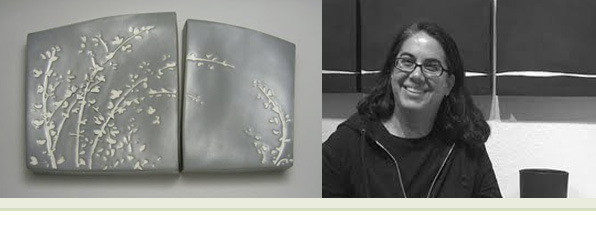Jill Oberman received her MFA from the School for American Crafts in 1995. She has done residencies at Anderson Ranch Arts Center, Arrowmont School of Arts and Crafts and the Archie Bray Foundation and taught at Kansas City Art Institute. While in her studio Oberman concentrates on creating simple minimal ceramic sculpture that have been widely exhibited across the United States.
What are some of the things you see young artists struggling with?
Many artists struggle with finding their own voice in their work. It is important to think about who you are, and who you want to be as an artist. With independence from school comes the challenge of creating work without the parameters of academia. Young artists often struggle with listening to what their heart tells them, and shifting their focus from making work that is constantly new and changing, to fully developing their ideas.
Young artists are often mobile, moving around from residencies and jobs. There are so many advantages to these constant changes: meeting new people, mastering new kilns, discovering new processes, experimenting with new materials, but this itinerant lifestyle may include many distractions to studio practice.
Be careful not to take on too much and burn out. When people set out driving for success, it can make them crazy. It is important to recognize that you cannot do everything at once; do what is reasonable instead of shortchanging your commitments. What works for some will not work for all, so pave your own path.
What advice would you give a young artist?
Do not put too much pressure on yourself. Your best work is yet to come. I wanted to make really great work right away, and that doesn’t always happen.
What was most difficult for you when you finished school?
For me it was balancing living and making. I have been forced to work outside my studio to earn money to support myself. I have found jobs working in arts administration, and that has been good for me to be surrounded by art and artist in my studio and in my work. Try different things, find your niche, and find your process and your own balance.
What have you done to help you get where you are?
When I committed to studying ceramics in school, it was a commitment for life. I decided that working in ceramics was the lifestyle that I wanted and I was lucky to have a supportive, friendly community around me that helped me to work hard and “stay in the game”. I also think it has been helpful to be fluent in the clay language. Know the history of the field, and keep up with what is happening in the contemporary scene. The more I expose myself to others, the richer I get. I worked as an assistant for the workshop program at Anderson Ranch for 8 summers, and I kept my eyes open. You have to be aware of you community.
Which do you find exerts a stronger influence on your work, success or failure?
I think on a certain level everything I have done to this point possesses elements of failure, and hasn’t been exactly what I envisioned at the onset. But that is also what drives me to make the next piece. There is success in the failure if it leads you to something else. I have always believed that the best way to give thanks to a teacher is to use the information that they taught you, and to pass that info on to others.
Can you give some tips on writing applications?
Be sure to follow directions and pay attention to the details. Be sure to proofread your entire application, use spell check, and have someone else read what you have written. Typos make you look careless. Submit only good quality images. Sign your cover letters. The small details are so important. Plan ahead, and don’t put your application together at the last minute, they always take more time than you first think. Give what is asked for. Do some research on the institution that you are applying to, and make your application specific for each opportunity. An application for a residency requires you to highlight different aspects of your career than a teaching application, for example. Be prepared with two resumes and two artist statements, one short and one long, and send the one that is most appropriate. It’s the same for marketing your work at a gallery. Be on time, and be professional; it can affect your career. And lastly, if you don’t get the residency or job that you are applying for, don’t give up. Keep trying, update your portfolio, and re-apply!
